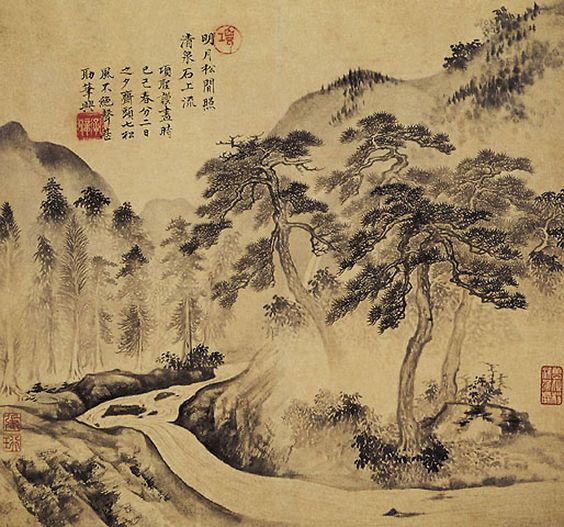Wang Wei died in 759, and thus did not outlast the devastating events of the An Lushan Rebellion (755–759).
In 756, the capital of Chang’an, causing great loss of life. Wang was captured by rebel forces and held as a prisoner but managed to escape. For this, he suffered a fall from the emperor’s grace. Grieving over the earlier deaths of his wife and mother, Wang retired to his home on the Wang River to study Buddhism, play musical instruments, paint and write poems.
The question – to whom is Wang Wei saying farewell?
Farewell Poem
Here in the hills, we bid farewell
The twilight fades as I close my twig door
Should the grass be green again next spring
Grandson, shall I see you once more
王維
Wang Wei
送別 詩
Farewell Poem
山中相送罷
日暮掩柴扉
春草明年綠
王孫歸不歸
Sòngbié
Shānzhōng xiāng sòng bà
rìmù yǎn cháifēi
chūncǎo míngnián lǜ
wángsūn guī bù guī
Notes on Wang Wei’s Farewell
Andrew W.F. Wong has given us a fine translation of two of Wang Wei’s Farewell Poems including this one. As it is short and straightforward, I thought I would give it a try. But then nothing good is ever straightforward.
Sòngbié, sòng bà
Sadly, rhyme and alliteration is often lost in translations.
The twist, if there is one, comes in line four. 王孫歸不歸, wángsūn guī bù guī, ends with a form Shakespeare would later adopt, to be or not to be, to come back or not. The question I ask is whether 王孫 wángsūn (王 wang, 孫grandson ) refers to a noble of the emperor’s house, as it is often translated, or to Wang’s grandson?
One other possibility exists. Wang Wei is obliquely addressing his younger brother 王縉, Wang Jin, one of the emperor’s chancellors.
In looking back, I notice that this translation is quite different from my earlier effort.












